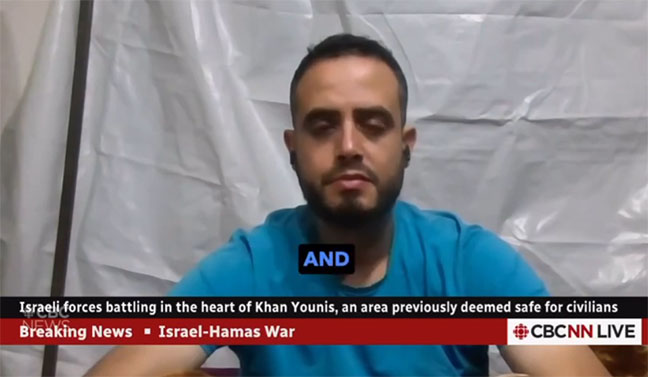Update: On Tuesday, February 6, Mansour Shouman posted a new video from southern Gaza, saying he had been on the run for two weeks to avoid Israeli tanks and sniper fire.
Washington, D.C., January 30, 2024—The Committee to Protect Journalists expresses deep concerns over the reports that Canadian-Palestinian citizen journalist Mansour Shouman went missing on his way from Khan Yunis to Rafah in the southern Gaza Strip and calls on the Israeli authorities to respond to claims that Israeli army forces arrested him.
Family members and colleagues of Shouman, who counts more than 291,000 followers on Instagram and has provided commentary to BBC, Fox News, and CBC News, told media outlets that they last heard from him on Sunday, January 21. They said he went missing on his way from Khan Yunis to Rafah in the southern Gaza Strip. Many Palestinians have left Khan Yunis for Rafah during the expanding ground invasion in Khan Yunis.
Shouman became a Canadian citizen in 2006. Two years ago, Shouman and his family decided to move to the occupied Palestinian territories so that his children could grow up in their ancestral homeland. He told the BBC that they chose to reside in Gaza, as it is his wife’s hometown. In November 2023, Shouman’s wife and their children fled from Gaza for the United Arab Emirates. But Shouman chose to stay, telling the BBC that he felt a responsibility to remain. “As long as 2.3 million people are suffering, I believe that it is my religious obligation, my humanitarian obligation, to stay and tell the story about what is really happening,” he said.
Sheltering in a tent next to a maternity ward at Nasser Hospital in Khan Yunis, Shouman, like many freelancers and citizen journalists, has become a window for the world into Gaza. Through his daily social media updates, Shouman’s journalism reached millions of English speakers and he has amplified the voices of people in Gaza on his YouTube channel. One month ago, he interviewed Al-Jazeera Bureau Chief Wael Al Dahdouh, about how he can continue reporting after losing several members of his family and his colleague and friend, Al-Jazeera cameraperson Samer Abu Daqqa.
In an interview with CBC News on Sunday, Shadi Sakr, a member of a volunteer team in Canada assisting Shouman with posting videos online, shared details about Shouman’s last known communication on January 21 at 3:02 p.m., when he sent a video from Khan Yunis. “His last message was, ‘Please get this back to me quickly. I don’t have a lot of time,'” Sakr said.
Workers from the relief organizations Shouman was assisting with aid witnessed his apprehension by the IDF, according to Sakr. The workers told Sakr that Shouman was leaving Nasser Hospital in Khan Yunis to travel to Rafah, when he was reportedly taken into custody by the Israel Defense Forces on his way. However, CPJ was unable to independently verify these eyewitness accounts or confirm the exact location where he is alleged to have been taken.
Shouman’s colleague Zaheera Soomar told CTV News, “There are three eyewitness accounts that on Tuesday, when he was making his way from Khan Yunis to Rafah, he was arrested by IDF.”
In a statement released on January 27, Grantly Franklin, spokesperson for Global Affairs Canada, stated, “Global Affairs Canada is aware of a Canadian who is missing in Gaza. Canadian officials continue to monitor the situation closely and are in direct contact with the family members. Due to privacy considerations, no further information can be disclosed.”
His disappearance occurred over a month after Shouman told The Independent he was concerned that Israeli forces were targeting Palestinian journalists in Gaza, with several of his colleagues killed in strikes.
“We are deeply alarmed by the disappearance of Shouman, who has been the eyes of the world into events of the war in Gaza,” said CPJ Middle East and North Africa Program Coordinator Sherif Mansour. “Israeli authorities must respond to claims that the IDF arrested the journalist, and, ensure the safety and well-being of the press, and immediately release the numerous journalists in Israeli prisons.”
Palestinian journalists who have been imprisoned during the war have reported incidents of beatings and threats. On December 7, 2023, Palestinian journalist Diaa Al-Kahlout, chief bureau correspondent for the Qatari-funded London-based pan-Arab newspaper Al-Araby Al-Jadeed, was arrested in northern Gaza. After his January release, he said that he was beaten and tortured multiple times, mostly by agents of the Shin Bet, Israel’s internal security agency. This included illegal “shabah” techniques in which prisoners are hung by their hands for hours or even days at a time. Al-Kahlout said that he had spent 25 out of the 33 days of his detention forced to remain in a kneeling position, causing him severe pain. Such techniques were outlawed by Israel’s highest court in 1999, but rules were relaxed in 2018, although torture still violates international law.
Since the start of the October 7 war, Israel has emerged as one of the world’s leading jailers of journalists, currently holding 19 Palestinian journalists in Israeli prisons. Most are held in administrative detention, which allows Israeli authorities to hold detainees without charge on the grounds that they suspect the detainee of planning to commit a future offense.
CPJ’s email requesting comment from the North America Desk of the Israel Defense Forces did not immediately receive a response.
